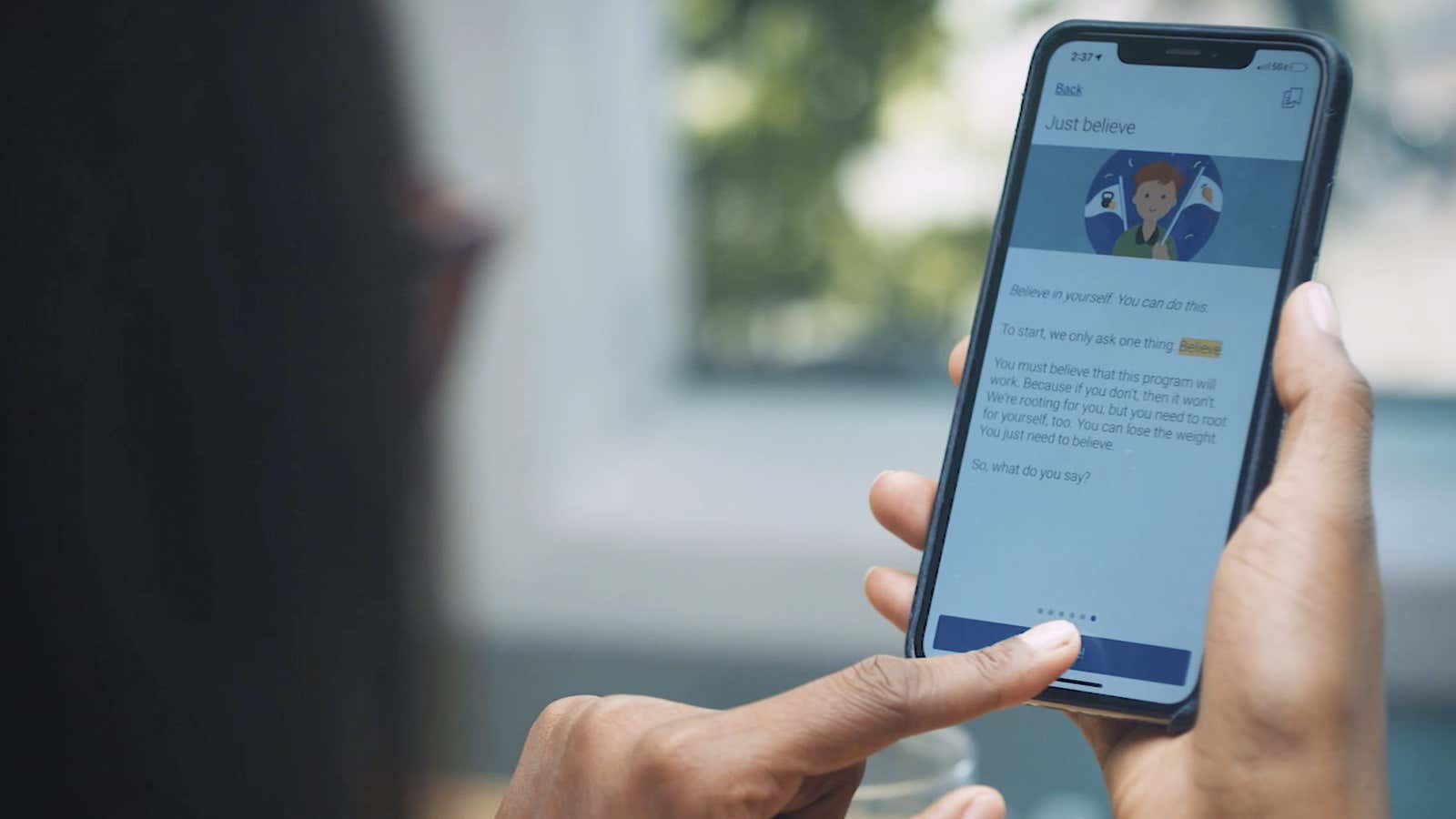If we were eating our feelings before the pandemic, we’re now drinking, baking, air-frying, and spatchcocking them, too. In one survey from the American Psychological Association, 40% of respondents reported some weight gain over the past year. A small study recently suggested that Americans gained about two pounds per month in that time.
And while a little waistband forgiveness may be in order, given larger public health concerns, the revenues generated by weight loss app Noom suggest that people are eager to get back to their pre-pandemic baseline. The company, which only launched its app in 2016, reported $400 million in revenue in 2020, double the year before.
Noom has been growing steadily since its debut, but the company has also been actively marketing its app in the US, UK, Canada, Australia, Ireland, and New Zealand, which may explain why you’re suddenly seeing it in your social feeds and on television, or hearing the Manhattan-based Noom mentioned as a sponsor of your favorite podcast. A few “I tried it and it worked” stories—including from prominent venture capitalist Mark Suster and USA Today editor Megan McCarthy—have also boosted Noom’s profile. But what’s actually in Noom’s special sauce?
How does Noom work?
Noom (simply “Moon” spelled backwards) was co-founded in 2008 by tech entrepreneur Saeju Jeong, who moved to New York from Korea in the mid-aughts, and Artem Petakov, a Ukraine-born former Google engineer. The pair first developed other iterations of fitness apps, including one called CardioTrainer, that informed what eventually became Noom. Jeong and Petakov are now Noom’s CEO and president, respectively.
The app asks users to track and log what they eat, weigh in daily, recall their goals frequently, and study nutrition, motivation, and decision-making, all in five-minute-per-day gamified, quiz-heavy lessons. The idea is to unlearn your bad habits with a curriculum based on psychological principles, including cognitive behavioral therapy, according to a company spokesperson. “We focus on food, fitness, sleep, and stress management,” Andreas Michaelides, chief psychology officer at Noom, told Rolling Stone. “If any one of these things is lacking, the whole system suffers. It’s like trying to drive your car with a wheel missing,”
Noom claims to blend AI and human coaching and says that all users are connected to a real person a few days into their program, but several users complain the humans actually sound like bots. (The Noom workforce includes 3,000 coaches, 90% of whom are full-time employees.) Blessedly absent from the app and Noom’s advertising are tropes like before-and-after photos, frozen meals, low-cal shakes, and magic bullets. The brand also doesn’t disproportionately target women, the gender most conditioned to feel body shame.
Membership averages $59 per month, though you only pay for the months required to reach your optimal weight. The expectation is that you’ll slim down safely, by one to two pounds per week. If all goes as planned, that weight loss should be sustainable because you’ll be that much more informed and intentional about your diet.
What is the Noom diet?
Customers are drawn to Noom because it promises to teach you something about yourself and your own thought processes and biases. That behavioral science hook has also appealed to tech investors, allowing Noom to raise $114.7 million in funding over four years, including $58 million in a Series E round last May, led by Sequoia Capital.
Nutritionists also tend to give Noom a stamp of approval because it helps people lose weight by eating fewer—and more nutritious—calories each day, although the program’s approach could still be triggering for anyone with a history of an eating disorder.
Where WW (formerly Weight Watchers) has “points,” Noom uses a color-coded system to guide eating decisions.
🟢 The least calorically dense and/or most nutrient-dense food options, which should represent 30% of what you eat in a day. Fruits and veggies, whole grains, whole wheat bread, tofu, and non-fat dairy are all “green” foods.
🟡 The middle ground foods—including low-fat dairy, black beans, chicken breast, tuna, salmon, couscous, plantains, rice noodles, legumes, and avocados—can provide 45% of your daily calories.
🔴 No more than 25% of your daily diet should come from the most calorically dense and/or least nutrient-dense foods, including nut butters and olive oil, pita bread, flour tortillas, plus all the hard-to-resist stuff, like red wine, sugary foods, pizza, burgers, and fries.
If business is brisk during the pandemic, it may not all be vanity. Michaelides also told Rolling Stone the company was increasingly “seeing goals tied to avoiding negative health consequences, which we hypothesize [is] linked to the risks of being overweight in the pandemic.”
Noom may not yet have the name-brand recognition of other booming fitness brands like Peloton and Fitbit, but it has been downloaded in more than 100 countries and offers localized editions for Japan, China, Germany, Spain, and the UK. The company recently announced its intention to expand into the lucrative B2B marketplace, likely with weight loss, hypertension, and diabetes programs. (A Noom spokesperson would only tell Quartz that Noom for Business is “a priority.”) The still-private company, which has been evaluating a public offering but has no definitive plans for one, claims to have “millions” of customers.
The Noom origin story
Jeong, 41, says the inspiration for Noom came from his late father, a noted doctor and hospital CEO in South Korea who died of lung cancer when Jeong was 20 years old. In the year before he died, Jeong’s father talked to his son about what being a doctor felt like: “Rather than being an expert in healthcare, he was a ‘sick care expert,’” Jeong told Everyday Health. “He felt powerless and hopeless. Disease prevention was so difficult to manage, and he wondered why.” His father also urged Jeong to go abroad rather than stay in Korea.
According to interviews, Jeong at first thought he’d become a physician, like his father and 28 other people in his family. But he couldn’t get into medical school and studied engineering instead. He spent three years as an army IT specialist in South Korea, where military service is compulsory for young men. Before moving to the US, Jeong also started the first heavy metal record label in South Korea, BuyHard Productions, in 1991, when he was 19 years old. (The mild-mannered CEO still listens to metal before almost all of his meetings, according to a Noom spokesperson, who says, “It’s what calms [and centers] him.”)

Jeong met Petakov at a dinner party and the duo discovered their shared interest in behavioral psychology. Noom became Jeong’s vehicle to promote preventive health without a medical degree. He has said that weight loss is a kind of gateway drug for Noom, but ultimately the app is meant to be useful for all kinds of behavior changes to improve health and wellbeing. Already, in 2017 Noom’s Diabetes Prevention Program became the first digital-only program to win recognition and approval from the US Centers for Disease Control and Prevention, and the company is currently beta-testing a program for stress and anxiety.
Dark side of the Noom
Noom has had stumbles already. The most public ones involved surprise charges on credit card bills (not uncommon for subscription services). Hundreds of customers have complained to the Better Business Bureau, and there has even been a class-action lawsuit filed against the company. Last summer, Jeong had to address Refundgate in an open letter on Noom.com, in which he promised to expand the customer support team.
Gamifying behavioral change isn’t all good, either. An app that bills itself as deeply knowledgeable about human behavior is naturally great at guiding its users’ thought processes. For example, when you sign up, a bot estimates how long it will take you to hit your goals and how much it will cost to get there, but adjusts both figures as you continue to enter data about yourself and your habits. Guess what? You’ll inevitably be told that your weight-loss project will actually take less time and money than that first (anchoring) prediction. On the upside, this plot twist may make your goal seem more achievable too.
Is Noom right for you?
If you’re currently debating whether to replace your wardrobe staples with clothes that can accommodate your #quarantine15, all you really want to know is does this program actually work? The answer may be yes, but that’s according, in part, to Noom. The app’s marketing and PR material cite weight-loss success rates and other results that often make it into press accounts of the company, but all of that (albeit interesting) research is conducted by or for the company and should be served with a grain of salt. (A spokesperson notes that “Noom has more than 20 published studies, each of which has been validated by peer review.”)
Plenty of personal accounts support Noom’s efficacy, too. One of the most prominent of these is by the aforementioned Mark Suster, of Upfront Ventures, who documented his recent weight loss—65 pounds in 18 months—online. Suster kickstarted his process by charting his goals on Noom and complying with its daily check-in requests, though he also eventually incorporated MyFitness Pal, and blood tests by EverlyWell.
In one post, Suster said of Noom: “There was nothing new, nothing I didn’t intellectually know, but it forced me to bring my knowledge [to] the surface and understand why I made bad food choices on occasions. It even spelled it out in well-known psychology terms for me.” He gives the example of realizing that his desire to eat junk food at the movie theater stems from childhood associations.
But while scores of Noom fans have posted similar testimonials on social media sites, the app has also left some influencers nonplussed. During her own Noom trial, life coach “Jaie Elizabeth” was dismayed by Noom’s take on an optimal daily calorie count. “I don’t want to offend anybody, but this is how white women diet,” she said in her YouTube review. “There’s nothing wrong with being that little, but I personally do not want to be that little.”
She also offered a broader warning: While you can pay for add-ons like eating plans and DNA tests, Noom is ultimately just smart packaging. “All they provide is logical and motivational assistance, and if that’s what you need, then this might be the thing for you,” Elizabeth said. “[They’re] not going to give you a personal trainer, they’re not going to give you workouts, or anything like that…But they do provide you with, like, an accountability partner situation.”
Correction: A previous version of this story incorrectly stated that Noom has raised 114.7 billion from investors. In fact, it has raised $114.7 million.
Keep reading:
- I tried weight-loss app Noom again after a year—here’s what changed (USA Today)
- Mind the App: Psychology-powered wellness platform Noom is helping people shed pandemic pounds (Rolling Stone)
- Three ways behavioral psychology might help you lose weight (The Conversation)
- A goal with a plan beats a resolution every day of the year (Quartz)
- A short history of terrible diets (Quartz)
- How to create good new habits, according to a Stanford behavior scientist (Quartz)
